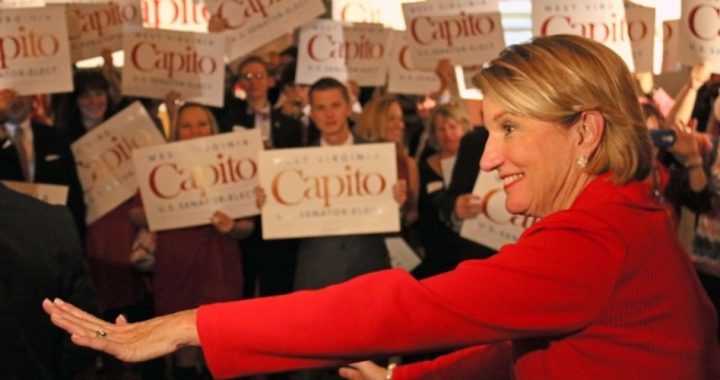
For the first time since the policies of Republican President Herbert Hoover so enraged West Virginia voters that the state shifted to the Democrats, newly enraged voters there have tossed the Democrats out in favor of the Republicans. While the shift was seismic when it comes to party labels, in political ideology, not so much, but an improvement nonetheless.
The first observation from West Virginia, when viewed as a microcosm of the national election on Tuesday, is the power of an enraged electorate in determining political outcomes.
Before the election, Republicans in the state’s House of Representatives trailed Democrats by six seats. After the election, Republicans now hold a 30-seat majority, a monumental shift of 36 seats.
In the state Senate, the shift was just as remarkable. Democrats held a 24-10 seat majority over Republicans prior to Tuesday’s elections. On Tuesday, Republicans kicked out six incumbent senators, winning seven seats total and, with the party switch by Senator Daniel Hall from Democrat to Republican announced on Wednesday, the Republicans now hold a 18-16 advantage.
At the federal level, Democrat Representative Nick Rahall found himself on the outside looking in after 38 years, being replaced by Republican Evan Jenkins by a vote of 55 percent to 45 percent.
For years, Rahall coasted to easy reelection, sometimes by default when no candidate opposed him. His record as a hard-core progressive Democrat wasn’t enough for West Virginia’s voters to oust him. Starting in 2008, his margins of victory were 67 percent, 56 percent, and 54 percent. In perspective, then, the 20-percent shift by the electorate measured more than just unhappiness with his support of the terrorist group the Palestine Liberation Organization (PLO) headed up by his good friend Yasser Arafat, his introduction of the bill banning the manufacture and sale of incandescent light bulbs, his endorsement of Democrat presidential candidate Barack Obama in 2008, or his close ties to OPEC member Qatar. It didn’t even matter to those voters that the Citizens for Responsibility and Ethics in Washington, a liberal watchdog group, named Rahall one of the most corrupt members of Congress in 2011.
It was the EPA’s threat to disembowel the coal industry with impossible carbon standards that caught voters’ attention and made Rahall a target for removal. At 65, Rahall wasn’t quite as quick on his feet as he once had been, missing the growing discontent among his constituents until it was too late. Even when he criticized the EPA for its overreach, his true intentions were revealed in 2013 when he attended a ceremony to rename the EPA’s new headquarters where he praised the chief administrator for her good work. Later, he actually supported a Republican bill that would have limited EPA’s authority, saying “I am dead set against the EPA’s plowing ahead on its own with new regulations to limit greenhouse gases.” But by then his electorate wasn’t listening.
Instead they were listening to his opponent, Evan Jenkins, who repeatedly and successfully tied his advertising message to Rahall’s link to Washington insiders and his support of the president and his environmental policies. When the West Virginia Coal Association endorsed his campaign in September, it was all over for Rahall.
The shift was equally remarkable in the Senate as heir-apparent Natalie Tennant appeared poised to move quietly into retiring Democrat Senator Jay Rockefeller’s chair, until the votes were counted. When the dust settled, voters instead replaced Rockefeller with current House Representative Republican Shelley Moore Capito (shown), who will be inaugurated in January. She will be West Virginia’s first female representative in Washington and the state’s first Republican senator in 55 years.
Not that Tennant didn’t try. She ran a powerful television ad showing her attempting to distance herself from the immolation in Washington, challenging the Washington pols with “Where do they think their electricity comes from?” and then pulling the switch on the flow of electricity to the White House, turning it dark. She promised that if she were elected she would “make sure President Obama gets the message.” But the ad belied her ties to the liberal Washington establishment with endorsements from Democrat Senator Joe Manchin, first lady Michelle Obama, retiring Senator Jay Rockefeller, and hard left Massachusetts Democrat Senator Elizabeth Warren, who even hosted a fundraiser for her. Her support for Obama’s election in 2008 and her support of his reelection as an Obama delegate to the 2012 Democratic National Convention didn’t help. But when she fumbled while answering the question as to whether she actually voted for President Obama in 2012, saying only that she voted for “the Democrat Party,” what remained of her credibility turned to ashes and dust.
This latest election shows what an informed and angry electorate can accomplish when sufficiently motivated. Politically, the midterms turned West Virginia from blue to red. It was historic. But from an ideological viewpoint, the change will likely be a lot less startling. With their jobs and livelihood so closely tied to the coal industry being threatened by federal regulations, Virginians’ votes more reflected disgust with incumbents rather than infatuation with challengers.
So those expecting a huge shift toward less government and more individual responsibility by West Virginia’s newly-minted representatives might be disappointed. From a constitutional standpoint, Capito’s record in the House during the 113th Congress was less than stellar, earning a 46 percent on The New American’s Freedom Index. And it won’t take much for Evan Jenkins to improve on Rahall’s Freedom Index rating of 34 percent.
For West Virginia, as it is for the rest of the country, whether the Republican Party can reinvent itself to reflect the new mood of distrust of government and its ever-increasing intrusions into private citizens’ lives remains to be seen.
Photo of West Virginia state Senator-elect Shelley Moore Capito: AP Images
A graduate of Cornell University and a former investment advisor, Bob is a regular contributor to The New American magazine and blogs frequently at www.LightFromTheRight.com, primarily on economics and politics.



